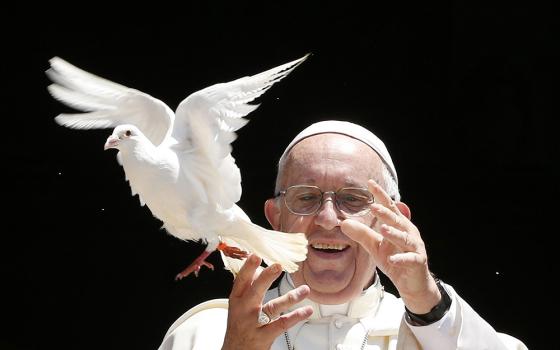In November, Archbishop Joseph Naumann of Kansas City, Kansas, was elected chair of the Committee on Pro-Life Activities of the U.S. Conference of Catholic Bishops. During my time as Hillary Clinton's running mate, Archbishop Naumann wrote an article in his archdiocesan newspaper criticizing my support for women's reproductive rights. Recently, the archbishop has repeated that criticism. I was heartened, however, by a recent interview in which he acknowledged that "we have an obligation to dialogue" with Catholic officials who hold my viewpoint.
I am personally opposed to abortion yet support its legality. Archbishop Naumann is personally opposed to abortion and wants to make it illegal. This is an important area for thoughtful dialogue.
I am a practicing Catholic and follow church teachings about the sanctity of life. In my personal life, that has meant long periods of abstinence, natural family planning, avoiding unwanted pregnancy, fidelity to my wife of 33 years, and welcoming the gift of three precious children. It has meant taking a year off from law school to work with Jesuit missionaries in Honduras and representing and ministering to people on death row. It has meant longtime public advocacy, together with my wife, for better adoption and foster care policies, for services to the poor and immigrants and disabled, for the advance of children, for good health care for all. It has involved opening our life and even our home to those in need, including — on one occasion — a pregnant teenager who needed a place to stay before having a baby.
Sometimes, Catholics who support women's reproductive rights get casually derided by church leaders as if being "personally pro-life" is just paying lip service to Catholic teachings. To the contrary, Catholics like me walk the walk and sacrifice to live our values every day.
Church law for Catholics is one thing. But, as a civil rights lawyer and elected official, I know that civil law for everyone is something else. In the area of the civil laws on contraception and abortion, I believe that the Griswold and Roe cases were decided correctly by the U.S. Supreme Court. While our church, or any faith, has the right to set terms for those who choose to belong to it, I do not believe that state law should be used to punish women or doctors for the decisions women make about contraception or abortion.
I have, and do, support some limits on abortion as contemplated by Roe and subsequent cases — parental consent for minors seeking abortion with a judicial bypass in the event that a minor's home situation makes that practically impossible, a ban on certain late-term procedures so long as there is an exception for the life and health of the mother, a ban on federal funding of abortions. But I fight to maintain a robust health safety net, including access to contraception and strong pro-adoption programs, partly because such policies help drive down unintended pregnancies and abortions. And I fight to protect women's constitutional rights to make their own choices about their pregnancies, free from arbitrary restrictions that are merely designed to undermine those rights.
In short, I believe Catholics should follow church teaching on the sanctity of life. And I also believe that Catholic values can be helpful to all. But enshrining Catholic teaching on contraception and abortion as law for all women, regardless of their faith or ethical background, goes too far.
Advertisement
We don't demand laws to compel every person to recognize Jesus Christ as God's son, or try to make all divorce illegal, or force people by law to serve the poor. Church teachings for Catholics should not be mandatory for all in our diverse and pluralistic society. This is particularly the case here because different faiths have different teachings about abortion and contraception. People are equipped by God with moral reasoning on these issues, and what the church cannot accomplish by persuasion should not be legally compelled by prohibition and punishment.
Archbishop Naumann understands this difference between rules of the church and rules of civil society. He warned in his diocesan article: "be wary of candidates who assume to take upon themselves the role of defining what Catholics believe or should believe." Precisely! As a devoted Catholic, it is natural for me to have opinions about the church, but I claim no role in defining church doctrine.
I believe the reverse is also true. A Catholic bishop is entitled to insist that Catholics follow church rules and to educate all about the values of our faith. And as citizens and leaders, our bishops will obviously have and express opinions on policy. But religious leaders — unless duly elected to political office and thus accountable to our diverse electorate — should not assume to themselves the role of defining what the civil law should be for everyone.
I am sure Archbishop Naumann would have sincere responses to each point I make. I hope his desire for dialogue is real, and I would welcome the opportunity to have a discussion about our respective roles and views in person.
[Tim Kaine is a Democratic Senator for Virginia. He was the vice presidential running mate of Hillary Clinton in the 2016 presidential election.]






